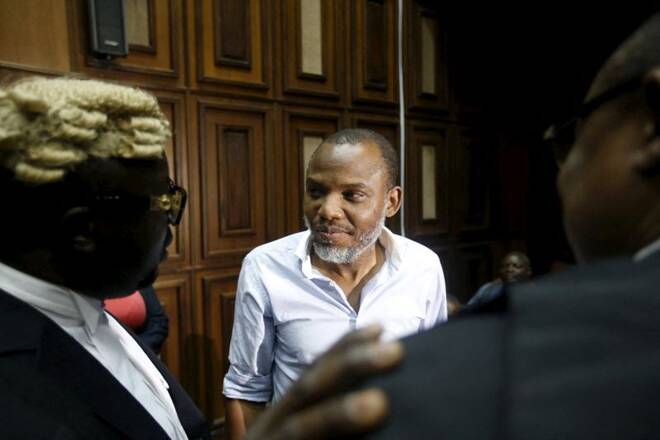Advertisement
Advertisement
Nigerian court drops terrorism charges against separatist leader Kanu
By:
ABUJA (Reuters) -Two judges at Nigeria's Court of Appeals on Thursday dropped terrorism charges against separatist leader Nnamdi Kanu's that had been brought against him by the government.
By Camillus Eboh
ABUJA (Reuters) -Nigeria’s Court of Appeal on Thursday dropped terrorism charges against separatist leader Nnamdi Kanu that had been brought by the government, in a unanimous decision by all three judges hearing the case.
The lead judge dismissed a seven count charge of terrorism against Kanu and discharged him, citing that a lower court had no jurisdiction to try the case and that Kanu was abducted and extraordinarily extradited to Nigeria.
The two other judges concurred with the ruling.
Kanu was not in the courtroom for the ruling.
“In view of the fact that the trial court lacks jurisdiction to hear this case because the process of extradition of the appellant from Kenya to Nigeria was unlawful since due process was not followed, this appeal succeeds,” the lead judge, Justice Oludotun Adefope Okojie, said.
“Consequently, the appellant is therefore discharged,” she said.
Nigeria’s High Court had in April ruled that Kanu should stand trial.
Kanu leads the Indigenous People of Biafra (IPOB), which campaigns for the secession of a part of southeastern Nigeria where the majority belong to the Igbo ethnic group. Nigerian authorities have labeled IPOB a terrorist organisation.
A spokesman for Nigeria’s attorney general said the government was considering its legal options following Thursday’s ruling, but said the charges Kanu faced before he disappeared while on bail in April 2017 “remain valid issues for judicial determination.”
Kanu had denied the charges of terrorism and knowingly broadcasting falsehoods, which are linked to social media posts he issued between 2018 and last year.
His lawyers argued that he could not receive a fair trial because he was forcefully extradited from Kenya to Nigeria. Kenya has declined to say if it played a role in Kanu’s return.
(Reporting by Camillus Eboh; Additional reporting by Felix Onuah; Writing by Chijioke Ohuocha; Editing by James Macharia Chege and Grant McCool)
About the Author
Reuterscontributor
Reuters, the news and media division of Thomson Reuters, is the world’s largest international multimedia news provider reaching more than one billion people every day. Reuters provides trusted business, financial, national, and international news to professionals via Thomson Reuters desktops, the world's media organizations, and directly to consumers at Reuters.com and via Reuters TV. Learn more about Thomson Reuters products:
Did you find this article useful?
Latest news and analysis
Advertisement
